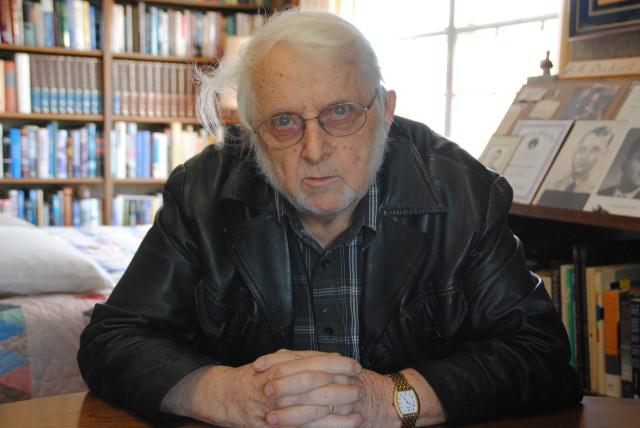
Dr. Gordon Deckert is angry.
He’s talking about the state of health care in America today, about childhood obesity and adult onset diabetes, about doctors who treat patients like cattle in a chute, about race and class and religion.
One topic flows into the next as deliberately and logically as a slow-moving river, but Deckert’s table-slapping, ear-piercing bursts of opinion are as unexpected and brilliant as lightning flashes.
“This country has a wonderful illness-treatment system,” says Deckert, sitting behind the desk in his home library with the authority of a judge. “But we do not have a HEALTH CARE SYSTEM!” He slaps the desk again as he yells, a startling pistol shot swallowed just as suddenly and quietly by the sea of books, awards, and old photos that adorn the library walls. “An effective health care system, and an effective physician, sees the priority of understanding the person and diagnosing the illness. You treat the person, not the disease.”
Deckert has not only spent decades training doctors to see patients more like human beings, he has assumed a personal responsibility to educate the entire culture about the root causes of what ails us. He’s served as the Chief of Internal Medicine at the Mayo Clinic, Chief of Medicine at Tinker Air Force Base and head of the Department of Psychiatry and Behavioral Sciences at the University of Oklahoma’s Health Sciences Center.
He was named “Medical Czar” of Oklahoma in 1957 and was tasked with designing protocols in the event of nuclear war. Awards have been named after him and bestowed upon him, and he has become something of a celebrity among medical professionals and policy makers. Despite the notoriety he has earned, however, Deckert feels his most important contribution to his field is teaching physicians that understanding the patient will lead to effectively treating the disease.
“I knew I wanted an academic career,” says Deckert, 85, when asked about the beginnings of his life in medicine. “But I wanted to bring a focus to those doctors who only feel responsible for their own practice instead of their whole community. Unlike the mechanical teachings of most medical schools, I taught the characteristics of effective physicians. An effective physician can understand the factors in a person’s life that have led him or her to this illness. An effective physician doesn’t have a nurse check a patient in and then shut them in a little room. When I give a presentation, they don’t say they learned something new about medicine. They say, ‘Hell, Deckert taught us how to deal with people.'”
It’s a theory that sounds like psychology and Deckert describes like a hobby. He smiles when he tells stories (of which he has several) of walking up to strangers in restaurants and “diagnosing” them: describing their health, their childhoods, their family lives, just by the way they look and interact with one another. He’s right more often than not, he says. Deckert believes that most illnesses — especially most American illnesses — can be attributed to socioeconomic factors that patients are subject to as young children.
“Human beings are born with a brain of above 300 CCs (cubic centimeters),” Deckert says. “As you develop, that same brain expands to about 1,400 CCs. If you are not given proper nutrition, emotional support, love, attention (…) your brain will not develop properly. I can almost guarantee a lousy adolescence, complete with obesity, tobacco use, all kinds of things. You’ve seen enough young people with no parents and no guidance and no nutrition and you know goddamn well how those kids end up if they’re deprived of those things.”
His wife, Jane, agrees. A former president of Oklahoma City Planned Parenthood, she says her poor upbringing was not only a revelation, but evidence of her husband’s assertions.
“I was born in a very small community on the border of Arizona and New Mexico,” she says. “I grew up with two very different cultures, and I learned very young that I wasn’t going to be somebody that put other people down. Young people need these things or their lives suffer. People who are well are generally pretty nice. People who are sick are awful.”
If it sounds more like modern psychology than standardized western internal medicine, that’s because it is. Deckert’s accomplishments (and let’s be honest, his age) have allowed him to express his opinions with a little more force than a younger man trying to make his way in the world, but his faculties are intact, his views informed. He’s insightful, weaves modern western medicine and ancient eastern philosophy into his conversations with equal ease, and is probably more progressive than any 85-year-old man you’ve ever met, academic or otherwise. Asking your grandpa about race is terrifying and should likely be avoided at all costs, but when Deckert brings it up, he’s railing against those who would use it as a divisive measure.
“There is no such thing as race!” he suddenly hollers, slapping the table again. “The origins of all modern human beings can be traced back to Africa. Different branches spread out and began developing differently, but human beings haven’t been around long enough to evolve into any differences that matter. It’s our insistence on creating an ‘us’ and a ‘them’ that has led to different social classes, which is unfortunate. But physiologically, there is no such thing as a black race, or a brown race, or a white race. It’s nonsense.”
Something else Deckert views as nonsense: mental health treatment in America, or the lack thereof.
“Calling it ‘mental health’ is ridiculous,” he says, glowering across his desk as if you’d just coined the term in his library. “People don’t have mental health issues, they have brain disorders, and we have the lousiest treatment of brain disorders in the world. Why is there a Department of Health and a separate Department of Mental Health (and Substance Abuse Services)? They’re the same thing and part of the same physiological system, but we operate like there are physical diseases over here, and mental health over here. Good God, that’s crazy.”
Given the force of his opinions, it might be easy to assume that Deckert is bitter, or feels unheard or left behind by his contemporaries. He’s not. His frustration seems to spring honestly from a deep well of responsibility for community, and from what he sees as a lack of action or education from policy makers and medical professionals. And, while he’s comfortable railing against a broken and mismanaged system, that doesn’t carry over to patients. Deckert has genuine compassion for those who place their care in a doctor’s hands, and wants other physicians to see past the diagnosis they’ve been trained to see.
“I had a woman patient one time, a very, very fat woman,” says Deckert, leaning back in his chair, his voice softening. “She came to me and asked me, ‘Dr. Deckert, why am I so fat?’ The first thing I told her is that I congratulate her on having guts. She had the guts to walk into a doctor’s office and ask me that question. The second thing I told her was that I had a hunch there was something in her life that was making her unhappy that she never dealt with, and she was using food as a substitute. She was scared of something and she needed to face it. There was no ‘medical’ reason for her obesity. Whatever the reason was, she had to answer that question for herself.”
Deckert straightens his chair and smiles as big as he has all morning. “I came home a few months later and there was a note taped to the door,” he says. “It said, ‘you were right, Dr. Deckert. I’m not scared anymore, and I’ve lost 50 pounds.”
Jack Fowler is a NonDoc contributing reporter. He hosts a weekly radio show on KOSU titled Tumbleweeds All The Way Down. To reach NonDoc with tips or potential stories, please contact us at editorial@nondoc.com.






















